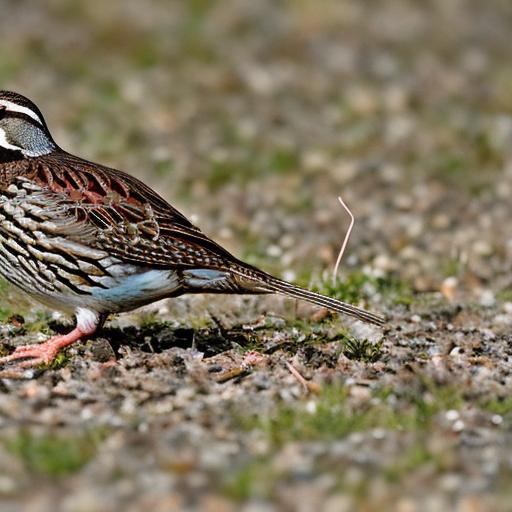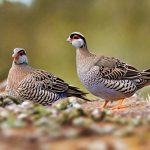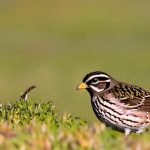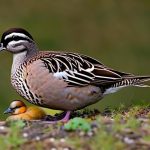When it comes to raising quail in Texas, it’s important to choose the right species that will thrive in the local climate and environment. There are several species of quail that are well-suited for Texas, including the Northern Bobwhite, Gambel’s Quail, and the Scaled Quail. Each species has its own unique characteristics and requirements, so it’s important to do your research and choose the species that best fits your needs and goals.
The Northern Bobwhite is one of the most popular quail species for Texas. They are well-adapted to the grasslands and brushy areas of the state, making them a great choice for those looking to raise quail for hunting or conservation purposes. Gambel’s Quail, on the other hand, are native to the desert regions of Texas and are known for their distinctive topknots and vibrant plumage. Scaled Quail, also known as blue quail, are found in the western and southern parts of Texas and are known for their striking scaled appearance. Each of these species has its own unique habitat requirements and behaviors, so it’s important to choose the species that best aligns with your resources and goals for raising quail in Texas.
In addition to considering the natural habitat and behavior of each species, it’s also important to consider the regulations and guidelines for raising quail in Texas. Some species may be subject to specific regulations or restrictions, so it’s important to familiarize yourself with the legal considerations for each species before making a decision. By choosing the right quail species for Texas, you can set yourself up for success and ensure that your quail thrive in their new environment.
Key Takeaways
- Consider the climate and your specific needs when choosing the right quail species for Texas
- Provide adequate housing and coop requirements for quail in Texas, including protection from predators and extreme weather
- Ensure proper feeding and nutrition for quail in Texas, including a balanced diet and access to clean water
- Implement health and disease management practices for quail in Texas, including regular check-ups and vaccinations
- Understand the breeding and reproduction process of quail in Texas, including optimal breeding conditions and care for chicks
- Be aware of legal considerations for keeping quail in Texas, including permits and regulations
- Tips for raising quail in the Texas climate include providing shade, ventilation, and protection from extreme temperatures
Housing and Coop Requirements for Quail in Texas
When it comes to housing and coop requirements for quail in Texas, there are several factors to consider to ensure the health and well-being of your birds. Quail require a safe and secure environment that protects them from predators and the elements while also providing ample space for them to move around and exhibit natural behaviors. Whether you are raising quail for hunting, conservation, or egg production, providing the right housing and coop setup is essential for their overall welfare.
Quail coops should be well-ventilated to prevent moisture buildup and allow for proper air circulation. Additionally, the coop should be predator-proof, with secure latches and fencing to keep out potential threats such as raccoons, snakes, and birds of prey. The coop should also provide protection from extreme temperatures, offering shade in hot weather and insulation in cold weather. It’s important to consider the natural habitat of the quail species you are raising and replicate those conditions as closely as possible within the coop environment.
In terms of space requirements, quail need enough room to move around freely and exhibit natural behaviors such as dust bathing and foraging. The coop should provide at least 1-2 square feet of space per bird to ensure they have enough room to thrive. Additionally, providing nesting boxes or areas for brooding is essential if you plan to raise quail for egg production or breeding purposes. By meeting these housing and coop requirements for quail in Texas, you can create a safe and comfortable environment for your birds to thrive.
Feeding and Nutrition for Quail in Texas
Feeding and nutrition are crucial aspects of raising healthy quail in Texas. Providing a balanced diet that meets the nutritional needs of your quail is essential for their overall health, growth, and productivity. Quail are omnivorous birds that require a diet rich in protein, vitamins, and minerals to support their high energy levels and rapid growth. Whether you are raising quail for hunting, conservation, or egg production, understanding their dietary needs is key to their success.
A high-quality game bird feed is an excellent option for feeding quail in Texas, as it is specifically formulated to meet the nutritional requirements of game birds such as quail. Game bird feed typically contains a high percentage of protein, which is essential for supporting muscle development and egg production in quail. Additionally, supplementing their diet with fresh fruits, vegetables, and insects can provide essential vitamins and minerals that may be lacking in commercial feed.
It’s important to provide access to clean water at all times, as quail have high water requirements, especially during hot weather. Water should be provided in shallow dishes or containers that are easily accessible to the birds. Additionally, offering grit or small stones can help quail with digestion by aiding in the breakdown of food in their gizzards. By providing a balanced diet that meets their nutritional needs, you can ensure that your quail remain healthy and productive in their Texas environment.
Health and Disease Management for Quail in Texas
Maintaining the health of your quail is essential for their overall well-being and productivity. In Texas, quail may be susceptible to a variety of diseases and health issues, so it’s important to implement proper management practices to prevent illness and maintain a healthy flock. Regular observation, biosecurity measures, and access to veterinary care are all important components of managing the health of your quail.
One of the key aspects of health management for quail is disease prevention. Implementing biosecurity measures such as quarantining new birds, controlling access to your property, and maintaining clean coops can help prevent the introduction and spread of diseases within your flock. Additionally, practicing good hygiene by regularly cleaning feeders, waterers, and coop bedding can help reduce the risk of disease transmission.
Regular observation of your quail is also important for identifying any signs of illness or injury. Monitoring their behavior, appetite, and droppings can provide valuable insight into their overall health. If you notice any changes or abnormalities, it’s important to seek veterinary care promptly to address any potential health issues before they escalate.
In addition to disease prevention and observation, providing a clean and comfortable living environment for your quail can help support their overall health and well-being. Clean bedding, proper ventilation, and access to fresh water are all essential components of maintaining a healthy flock. By implementing these health management practices for your quail in Texas, you can help ensure that they remain healthy and productive.
Breeding and Reproduction of Quail in Texas
Breeding and reproduction are important considerations for those looking to raise quail in Texas. Whether you are interested in expanding your flock or producing quail for hunting or conservation purposes, understanding the breeding behavior and requirements of quail is essential for success. Quail are prolific breeders that can produce multiple clutches of eggs each year under the right conditions.
In order to encourage successful breeding and reproduction, it’s important to provide a suitable nesting environment for your quail. Nesting boxes or areas should be provided within the coop or outdoor enclosure to give the birds a safe and comfortable place to lay their eggs. The nesting area should be filled with soft bedding material such as straw or wood shavings to provide insulation and protection for the eggs.
Quail eggs typically have an incubation period of around 23-24 days, during which time they require consistent warmth and humidity to develop properly. If you are interested in hatching quail eggs, investing in an incubator or broody hen can help facilitate the hatching process. Once hatched, the chicks will require a warm and secure brooding area with access to feed and water to support their growth and development.
Understanding the breeding behavior and requirements of quail is essential for successfully raising healthy chicks in Texas. By providing a suitable nesting environment and supporting the hatching process, you can encourage successful breeding and reproduction within your flock.
Legal Considerations for Keeping Quail in Texas

When it comes to keeping quail in Texas, there are several legal considerations that must be taken into account to ensure compliance with state regulations. Depending on your location within Texas, there may be specific guidelines and restrictions related to raising quail that you must adhere to in order to operate within the law.
One important legal consideration for keeping quail in Texas is obtaining the necessary permits or licenses required by state or local authorities. Depending on the purpose of raising quail (e.g., hunting, conservation, egg production), there may be specific permits or licenses that are required before you can legally keep quail on your property. It’s important to research the specific regulations in your area and obtain any necessary permits before starting your quail operation.
In addition to permits and licenses, there may be specific regulations related to housing, transportation, or sale of quail that must be followed in order to comply with state law. For example, there may be restrictions on the types of enclosures or coops that can be used for housing quail, as well as guidelines related to transporting or selling live birds or eggs. Familiarizing yourself with these regulations can help ensure that you operate within the legal boundaries when keeping quail in Texas.
By understanding and adhering to the legal considerations for keeping quail in Texas, you can avoid potential fines or penalties while also contributing to the conservation and responsible management of quail populations within the state.
Tips for Raising Quail in the Texas Climate
Raising quail in the Texas climate presents unique challenges and considerations due to the state’s diverse geography and weather patterns. Whether you are located in the humid coastal regions or the arid desert areas of Texas, there are several tips that can help you successfully raise healthy quail in this environment.
One important consideration when raising quail in Texas is providing adequate shade and ventilation within their housing or outdoor enclosures. The hot temperatures experienced in many parts of Texas can be stressful for quail, so it’s important to provide shaded areas where they can escape from direct sunlight during the hottest parts of the day. Additionally, ensuring proper ventilation within their coop or enclosure can help prevent heat buildup and maintain a comfortable environment for the birds.
Another tip for raising quail in the Texas climate is providing access to clean water at all times. Quail have high water requirements, especially during hot weather, so it’s important to regularly check waterers and ensure they are filled with fresh water. Additionally, providing shallow dishes or containers filled with water can help quail cool off during hot weather.
Finally, it’s important to consider the natural habitat of the specific quail species you are raising when creating their living environment. Whether it’s providing brushy cover for Northern Bobwhite or sandy areas for Scaled Quail, replicating their natural habitat within your property can help create a comfortable environment where they can thrive.
By implementing these tips for raising quail in the Texas climate, you can create a suitable environment where your birds can thrive despite the challenges presented by the local weather patterns.
If you’re considering keeping quail in Texas, you may also be interested in learning about the best location for a chicken coop. Poultry Wizard has a helpful article on where to put a chicken coop, which provides valuable insights into creating an optimal environment for your poultry. Understanding the ideal placement for your coop can contribute to the overall well-being and productivity of your quail or chickens.
FAQs
What are the regulations for keeping quail in Texas?
In Texas, the regulations for keeping quail are governed by the Texas Parks and Wildlife Department. It is important to check with the department for specific rules and regulations regarding the keeping of quail.
What are the best practices for keeping quail in Texas?
Best practices for keeping quail in Texas include providing a suitable habitat with proper shelter, food, and water. It is also important to ensure that the quail are protected from predators and have access to veterinary care when needed.
What are the common predators of quail in Texas?
Common predators of quail in Texas include snakes, raccoons, foxes, and birds of prey. It is important to take measures to protect quail from these predators when keeping them in Texas.
What is the best diet for quail in Texas?
The best diet for quail in Texas includes a combination of commercial quail feed, seeds, grains, and insects. It is important to provide a balanced diet to ensure the health and well-being of the quail.
What are the benefits of keeping quail in Texas?
Keeping quail in Texas can provide benefits such as fresh eggs, pest control, and the enjoyment of observing and caring for these unique birds. Additionally, quail can contribute to the local ecosystem and biodiversity.
Meet Walter, the feathered-friend fanatic of Florida! Nestled in the sunshine state, Walter struts through life with his feathered companions, clucking his way to happiness. With a coop that’s fancier than a five-star hotel, he’s the Don Juan of the chicken world. When he’s not teaching his hens to do the cha-cha, you’ll find him in a heated debate with his prized rooster, Sir Clucks-a-Lot. Walter’s poultry passion is no yolk; he’s the sunny-side-up guy you never knew you needed in your flock of friends!







